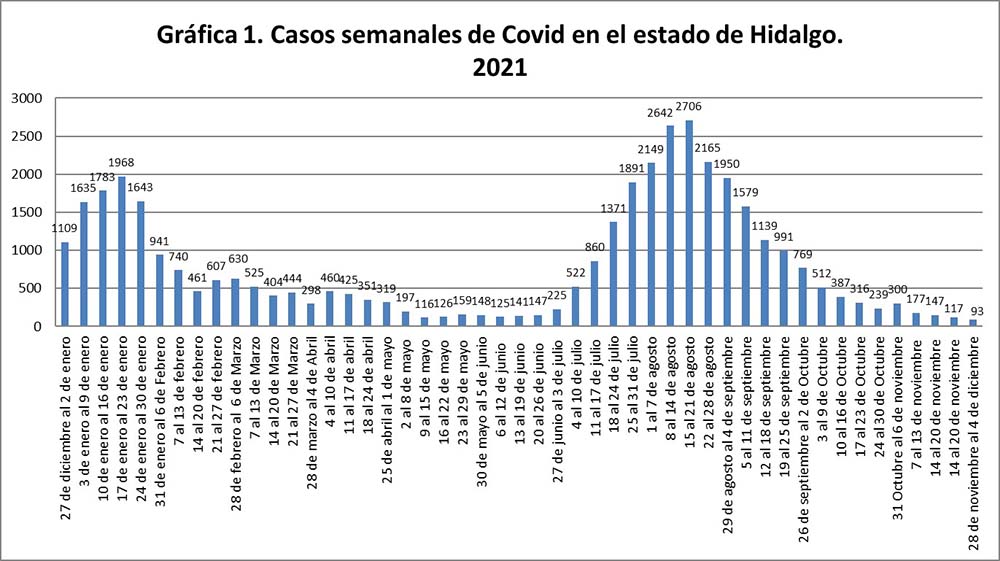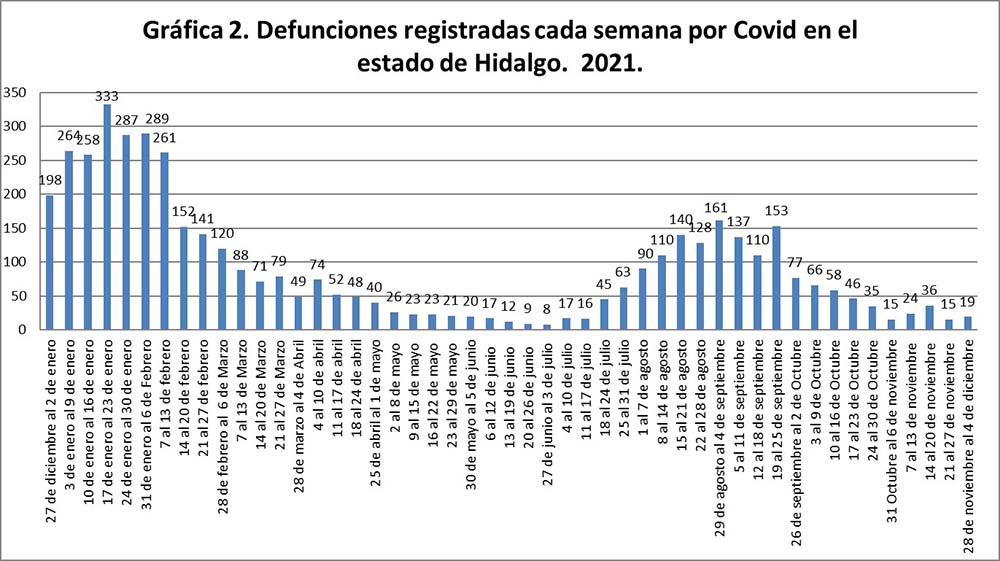Coronavirus Cases in Hidalgo Reach Lowest Level in the Pandemic

José Aurelio Granados Alcantar
Ph.D. in Regional Development and Territorial Planning
This last week, from November 28 to December 4, was the period with the fewest persons infected with coronavirus in the state of Hidalgo during the entire pandemic, with 96 cases. The previous period, from November 21 to 27, 117 cases were recorded, which means that there was a 21% decrease in the number of cases in the last week compared to the previous week (See Graph 1). This slowdown in the number of infections is also clearly reflected in the monthly figures, since only 715 cases were recorded in November, far from the 10,109 recorded in August of this year, when there were the highest number of cases in this pandemic, but also slightly higher than the month with the fewest cases, which was June with 644.
This low level of infection not only in the state of Hidalgo, but also in most of the country, puts Mexico at an advantage compared to some countries, especially in Europe, which are currently suffering a high transmission of coronavirus due to the Delta variant; And it is an incentive to face the new mutation of the SARS-CoV-2 virus, Omicron, since the fact of having the epidemic under control gives us a margin of time to have a strategy to face the new variant, and this will be to give a booster dose to people already vaccinated, as announced by President Andrés Manuel López Obrador last weekend and which was launched on Tuesday, December 7.
Although the degree of threat posed by Omicron to the vaccines is not known, for now, the existing boosters are the best defense against the new strain and the highly transmissible Delta variant, according to the announcement made by Dr. Anthony Fauci, the chief medical advisor to the White House in the United States.
Studies show that an additional dose of the current Covid vaccines "increases levels of neutralizing antibodies against all variants," Fauci said. He added that "there is every reason to believe that if you get vaccinated and boostered, you would have at least some degree of cross-protection, most likely against serious disease, including against the Omicron variant."
In Mexico there is time to ensure that people, especially the most vulnerable, get their booster dose before the Omicron variant spreads throughout the country. But one thing should be clear to us, if the new variant does not become as virulent as the previous ones, it is only a matter of time before another mutation emerges and turns the whole world upside down. As long as there are countries that do not have access to vaccines and there is a proportion of people who do not want to be vaccinated, this virus will be there, reminding us how vulnerable we are.
Finally, deaths, although they have decreased, the levels are still high according to the number of cases. In the last two weeks, 15 deaths were recorded, i.e. from November 21 to 27 and from November 28 to December 4 (See Graph 2).

Source: Own elaboration based on SSA Daily Technical Communiqués. https://www.gob.mx/salud/documentos/coronavirus-covid-19-comunicado-tecnico-diario

Source: Own elaboration based on SSA Daily Technical Communiqués. https://www.gob.mx/salud/documentos/coronavirus-covid-19-comunicado-tecnico-diario
WHO IS...?
José Aurelio Granados Alcantar holds a PhD in Regional Development and Territorial Planning from the University of Barcelona, Spain. He is a research professor in the academic area of Sociology and Demography, Institute of Social Sciences and Humanities (ICSHu) at the Autonomous University of the State of Hidalgo (UAEH). He is a member of the National System of Researchers, level I.